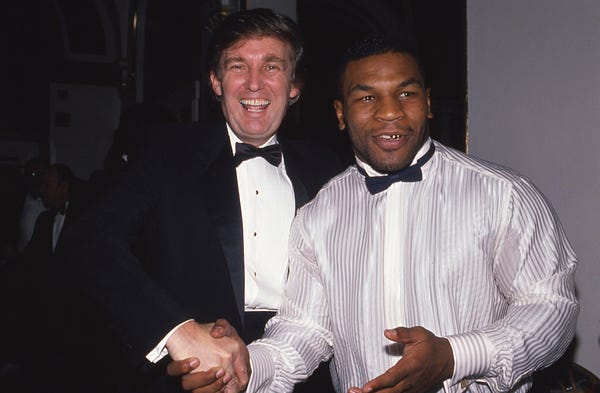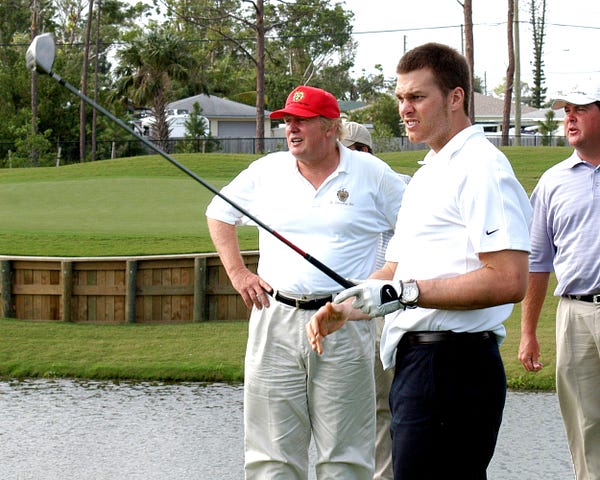What Sports Mean to Donald Trump – The Ringer (blog)

 In 1984, Trump was interviewed by the sportswriter Robert Lipsyte. It was the rare matchup of a liberal humanist and a voracious capitalist. But Trump, who was then owner of the USFL’s New Jersey franchise, was hungry for publicity. In their interview, Lipsyte noticed a tic he called Trump’s “predatory empathy” — an ability to divine “what his interviewer wanted to hear and then reshaping himself and his answer accordingly.”
In 1984, Trump was interviewed by the sportswriter Robert Lipsyte. It was the rare matchup of a liberal humanist and a voracious capitalist. But Trump, who was then owner of the USFL’s New Jersey franchise, was hungry for publicity. In their interview, Lipsyte noticed a tic he called Trump’s “predatory empathy” — an ability to divine “what his interviewer wanted to hear and then reshaping himself and his answer accordingly.”
Lipsyte was a champion of athletes’ rights. So Trump told him that, as a pro sports owner, “you should be decent, you should be fair, you should be straight.” If that was as opaque as his promise that “everybody” would be covered by Trumpcare, that was precisely the point.
When he wasn’t playing sports and being a national coach, Trump saw sports as a tool of business. In 1984, he bought that team in the struggling USFL less as act of fandom than as a ploy to force his way into the NFL. In Trump: The Art of the Deal, Trump bragged of signing Doug Flutie to a contract valued at more than $1 million a year, and then — because Flutie supposedly increased the value of the league — asking fellow owners to help pay the bill. (They declined.)
When Trump pressed the league to move its games from spring to fall and go head-to-head with the NFL, the league collapsed. Trump would chalk up the failure not to poor strategy but to violating his own credo: Instead of buying an NFL team, he had cheaped out. “In real estate terms, I was buying the South Bronx instead of Fifth Avenue and 57th Street,” he wrote.
In 2004, Trump met a golfer named Natalie Gulbis during a tournament at one of his courses in Florida. Gulbis would later say the meeting had been arranged by God. Trump became Gulbis’s capitalist spiritual adviser, tutoring her on the art of branding. (She issued a calendar with swimsuit photos and had a reality show on the Golf Channel; Trump put on her The Celebrity Apprentice.) Trump told Gulbis to push for the same endorsement fees as male golfers. And so in her Republican National Convention speech, Gulbis cast Trump — the guy heard on tape bragging about committing sexual assault — as a man who helped her to “stand up to gender injustices.”

As a businessman, sports was a backdrop for Trump’s benevolent acts. At the Republican National Convention, Trump’s pal Tom Barrack told a story of accompanying Trump to a Mike Tyson fight in Atlantic City. There, Trump encountered a man who told him his young son was having health problems. Trump sent a program backstage inscribed to the man’s son: “I came here tonight to see two champions, Mike Tyson and your dad.”
Watching Barrack’s speech in Cleveland, I thought the scene he was describing was so aristocratic as to be offensive. (Trump and Barrack had traveled to the fight by helicopter, and used the arena’s back entrance to avoid “10,000 cameras.”) But the idea of a billionaire pausing his extravagant life to minister to Joe Sixpack was more than an anecdote. It was the winning rationale of Trump’s campaign. “What kind of man in the middle of his celebrityship has the presence to focus on the littlest guy in the shop?” Barrack said. “[T]hat is Donald Trump.”
When his playing field moved from business to politics, Trump used sports as a wedge issue in the culture war. In this, Trump was hardly alone. Obama liked being America’s third-string quarterback, sending coded signals to his base from the sideline. He once told the New Republic that if he had a son he’d “have to think long and hard” before letting him play football.
You might think of Trump as a third-stringer on the opposing team. Or — better yet — a pundit on the other sports cable channel. Trump mocked “softer” NFL concussion protocols that sideline players who get “a little ding on the head.” Tim Tebow was listed as a speaker in Trump’s early convention plans. (Tebow didn’t speak.) And last summer Trump declared: “Do we all love NASCAR? Because I do.”
Golf seems to contain all the features of Trump the businessman. There’s the braggadocio: The club championships Trump won over the years were “really like majors for amateurs.” The shameless flip-flopping: Trump once blasted Obama for golfing through his presidency, then spent 19 of his first 87 days in office on the course; his press corps, often barred from observing his game and playing partners, made due with peepholes. There’s also that infamous predatory empathy: Trump said upon opening Mar-a-Lago as a club that it would be available to all races and religions, unlike some other clubs in Florida.
Yet last year, when the PGA moved an event from a Trump Florida course to Mexico City, Trump cracked, “I hope they have kidnapping insurance.” It was lines like that — and the ethno-nationalist campaign that spewed them — that convinced a number of Patriots to skip the White House visit. As running back LeGarrette Blount said, “I don’t feel welcome in that house.”

 In Trump’s mind, he has one great, unbreakable connection with pro athletes. He lives like one. “These guys haven’t made money on microchips or stocks,” Nunberg said. “They don’t want to hang out with Mark Zuckerberg. Trump’s a man’s man.”
In Trump’s mind, he has one great, unbreakable connection with pro athletes. He lives like one. “These guys haven’t made money on microchips or stocks,” Nunberg said. “They don’t want to hang out with Mark Zuckerberg. Trump’s a man’s man.”
And like a lot of athletes, Trump sees himself as a showman. “We were the WrestleMania of politics,” said Nunberg. “There was something smashmouth about our campaign, something grandiose.” In February, as Trump was trying to install a travel ban centered on seven Muslim-majority nations, he was admiring a boastful quote by Muhammad Ali, the most famous Muslim athlete in the world.
Trump acts so much like a jock that there are times when the White House has the feel of a taxpayer-funded locker room. Lipsyte noted that Trump is “normalizing a basic tenet of jock culture: Anyone not on the team is an enemy, the Other.” I would add that in the nonstop palace intrigues (Jared Kushner vs. Bannon, etc.), you can see hints of an athlete’s paranoia about his teammates. As Trump once wrote: “Lions in the jungle kill for food, but humans kill for fun. Even your friends are out to get you: they want your job, they want your house, they want your money, they want your wife, and they even want your dog. Those are your friends; your enemies are even worse!”

For someone with Trump’s binary view of humanity, sports are a great gift. Here’s a discipline — unlike North Korean diplomacy or the debate over the Export-Import Bank — that picks clear winners and losers every day. As Trump wrote in Think Big, “One of the things I love about sports is you see in a very small period of time whether an athlete folds or thrives under pressure.”
Trump once mused that his Republican National Convention might include a “winner’s night,” when champions would sing his praises. Nunberg said Trump once sent Tom Brady a note congratulating him for standing up for himself at a Deflategate press conference. Compare that to Trump’s reaction when Attorney General Jeff Sessions recused himself from the Russia investigation, which reports said Trump saw as an unforgivable display of weakness.
“Tom Brady is a great friend of mine,” Trump has said. “He’s a winner and he likes winners.” There is a lot of Walter Mitty in that statement: a hint that Trump sees himself as the Brady of politics. “Melania is my Gisele,” said Timothy O’Brien, completing the fantasy. “And I’m the guy taking the snap in the fourth quarter with no time left who’s going to lead the team to victory. That is authentically how he sees himself and how he projects himself onto the world.”
Every sports fan has spent a few minutes of their miserable lives pretending to be an athlete. Trump also competes with athletes. He once suggested that Derek Jeter and Alex Rodriguez had hit the skids because they moved out of Trump properties. In a January speech to the CIA, Trump boasted that he’d been on the cover of Time more than Tom Brady.
That, I think, is the feature that makes the new sports-fan-in-chief unique. Trump is genuinely and passionately in the thrall of sports. But in cultivating an image as life’s ultimate winner, he also feels he has ascended above the men and women who play it. Brady may have won the Super Bowl, but it’s Trump who is welcoming Brady to the greatest piece of real estate in the world. Scoreboard.





